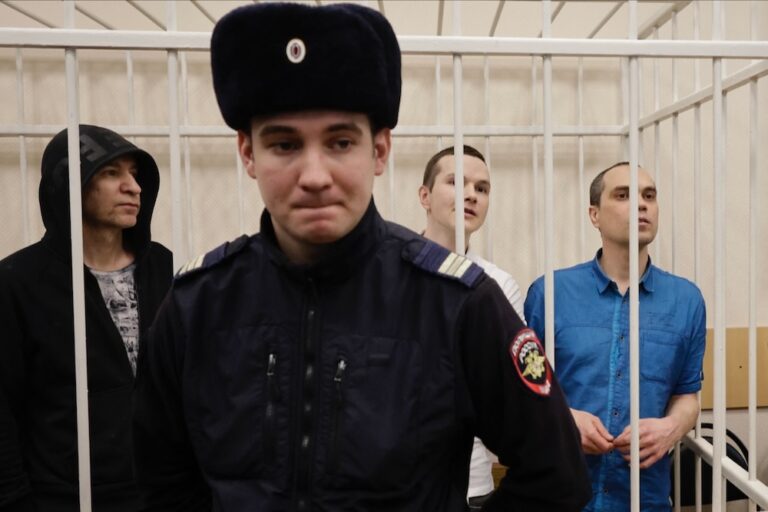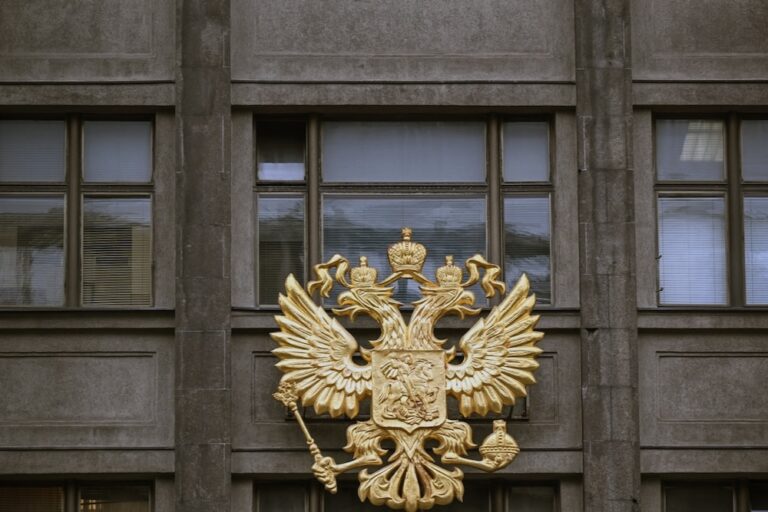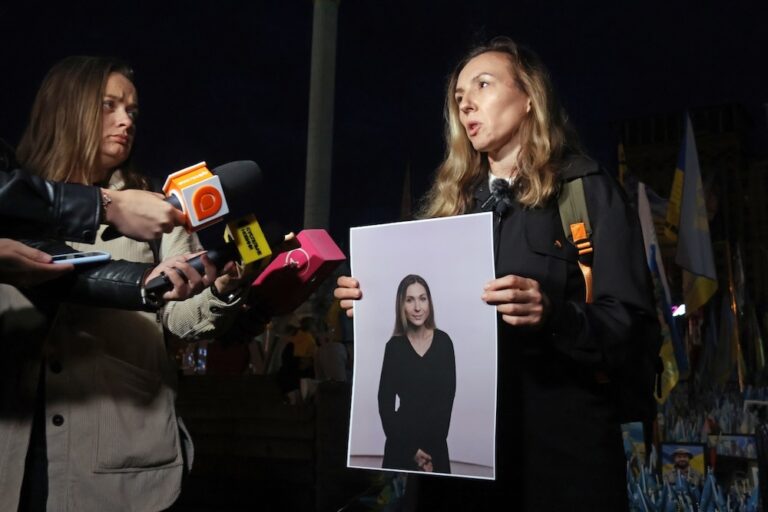(ARTICLE 19/IFEX) – The following is an ARTICLE 19 statement on the Doctrine of Information Security of the Russian Federation, followed by a protest letter to Russian President Vladimir Putin on the issue: 26 September 2000 Statement by ARTICLE 19 on the Doctrine of the Information Security of the Russian Federation ARTICLE 19, the Global […]
(ARTICLE 19/IFEX) – The following is an ARTICLE 19 statement on the Doctrine of
Information Security of the Russian Federation, followed by a protest letter to Russian President Vladimir Putin on the issue:
26 September 2000
Statement by ARTICLE 19 on the Doctrine of the Information Security of the Russian Federation
ARTICLE 19, the Global Campaign for Free Expression, is extremely concerned about the adoption on 9 September 2000 of the Doctrine of the Information Security of the Russian Federation. The Doctrine outlines the principles for the protection of information security, defined as “national interest in the information sphere”, through the tight control and limitation of the information in the public domain. Although the Doctrine is not legally binding, the document provides guiding principles for the bringing into law of a wide range of measures to address the perceived threat to information security. It thus provides a pernicious and negative contribution towards the shaping of provisions in the Russian Federation with regards to freedom of information and media freedom generally.
ARTICLE 19 is particularly concerned about the tone of the document and the negative perspective of the Doctrine vis-à-vis the flow of information in the Russian Federation. Indeed the document focuses on the presumed imperative need to protect information, therefore placing an emphasis on its withholding, perpetuating the country’s culture of secrecy rather than calling for openness and free flow of information. The control which the Doctrine recommends is placed on information is in clear contradiction with the constitutional guarantees which all people residing in the Russian Federation ought to enjoy, as well as international standards of freedom of expression, particularly those enshrined in Article 10 of the European Convention of Human Rights and Article 19 of the International Covenant of Civil and Political Rights, to which Russia is signatory.
With regards to publicly-held information, the culture of secrecy and the unnecessary emphasis on protection and control also run contrary to the ARTICLE 19 Principles of Freedom of Information Legislation, which are based on the principle of maximum disclosure, whilst the admissible restrictions to the people’s right to know should be prescribed by law and drawn as narrowly as possible.
The concerns expressed in this statement highlight but a few of the flaws of the document which, in addition to potentially severely limiting the free flow of information in the Russian Federation, is unnecessarily repetitive, excessively wordy and confusing.
State Control of Information
ARTICLE 19 is concerned by the degree of state control on information recommended by the Doctrine, and the call, in several sections of the Doctrine, for this to be increased, for example via “the development (…) of the mechanisms to enhance the effectiveness of state supervision of the activities of state-owned mass media and the implementation of state information policy”. The Doctrine also advises that measures are taken to “protect the internal market from the penetration of inferior-quality means of informatization and information products” whilst among the threats affecting information security, the Doctrine lists the “blocking of activities of state mass media in informing the Russian and foreign audiences”. State interventionism vis-à-vis the control of information is emphasised by the language employed, for example when it is stated that the government should “create… a system of counter-action to monopolisation by domestic and foreign structures of the component of the information infrastructure” and “step up counter-propaganda activities to prevent the negative consequences of the dissemination of disinformation”, as well as “intensifying law-enforcement activities of the federal bodies of executive power … including prevention and stopping of violations in the information sphere” [our italics]. The emphasis on prevention might also lead to the employment of illicit and disproportionate measures that are justified in light of the alleged necessity to prevent threats to the country’s security.
Furthermore, special leeway is given to the President of the Federation, who, according to the document’s guidelines, should be in a position to directly intervene upon the means of information to hinder the free flow of information by “sanction[ing] actions to ensure the information security (…), reorganis[ing] and abolish[ing] the bodies and resources subordinate to him for ensuring information security”.
The degree of top-down scrutiny and potential intervention in the running of state and non-state media is clearly not conducive to the creation of the conditions allowing the media to fulfil its role in a democratic society. Such a role, as established by the European Court of Human Rights, consists in freely reporting and fulfilling the function of “government watchdog”, thereby contributing to the transparency of the political processes.
Foreign Intervention
At the core of the document seems to be a feeling of distrust vis-à-vis foreign elements which might threaten Russia’s “information security”, through the “massive introduction of foreign information technologies”. Hence in the Doctrine the Russian government calls for “defining more clearly the status of foreign information agencies, mass media and journalists as well as investors” and to counteract the “use of uncertified domestic and foreign information technologies”. In addition, the Doctrine advises upon the development of domestic information technology to ensure the country’s technological independence. Any restrictions on the flow of information from foreign media, whether they are based in Russia or abroad, infringe the principle stated in international law that freedom of expression should be protected “regardless of frontiers”.
False News Provisions
The Doctrine emphasises the importance of dissemination of accurate information, while calling for penalties for disinformation or the malicious and “deliberate dissemination of false information”. False news provisions have been struck down by three national courts and are regarded with suspicion by most modern democracies and perceived as yet another tool to filter and reduce the information that is made available to the public. Indeed, in the interest of disseminating timely news, even the best journalists might make mistakes and the time spent fulfilling too stringent requirements of accuracy would certainly deprive the audience of much information that is of public interest. In addition, the penalties recommended to be imposed for disinformation are a powerful deterrent for journalists, severely limiting their freedom to expose cases of corruption and maladministration.
Mandatory Licensing
As part of the strategy to increase government control of the media and of the means of information, recommendations for mandatory licensing are present in several sections of the Doctrine. Licensing of journalists by the state runs completely counter to international standards under all circumstances. Registration of media outlets is only acceptable if it is for administrative purpose only and is automatically granted.
Blanket Bans
The Doctrine recommends imposing excessively wide restrictions on the free flow of information that is in the public interest, such as that concerning environmental hazards, the military forces and the economy. Instead, legitimate restrictions should only be permitted when the harm caused by the disclosure of information outweighs the benefits of exposure, especially when public interest is at stake. This is particularly true with issues that directly and profoundly affect the population, such as information on potential environmental hazards.
The adoption of the Doctrine of Information Security of the Russian Federation clearly marks a backward step in the campaign for greater freedom of information in the Federation, by limiting the free flow of information and reversing the process towards a culture of openness and transparency, which is at the basis of the democratic process. In some parts of the Doctrine, constitutional guarantees and international standards of freedom of expression such as openness and transparency are upheld, but are immediately annulled by following statements that are diametrically opposed to such rights. The Doctrine constitutes the foundation for potential Soviet-style control of information by perpetuating the opacity and closeness of the political processes. For the Russian Federation to fully comply with its obligations under international law, to abide by the international standards of freedom of expression and to show a serious commitment to the democratic process, the Russian government ought to immediately revoke this document.
See The Public’s Right to Know, Principles on Freedom of Expression Legislation, ARTICLE 19, International Standards Series, London, June 1999.
Letter to President Putin:
26 September 2000
Vladimir Putin
President of the Russian Federation
g. Moskva, Kreml
Russian Federation
Fax: +7 095 206 51 73 / 206 62 77
Dear President
ARTICLE 19, the Global Campaign for Free Expression, is extremely concerned about the introduction of the Doctrine of the Information Security of the Russian Federation which you signed into force on 9 September. Although we understand this Doctrine to be a set of guiding principles and not a legally-binding document, it is clearly a statement of the attitude of your government towards the free flow of information within the country and as such represents a severe threat to freedom of expression and information in the Federation.
As a signatory to Article 19 of the International Covenant on Civil and Political Rights and Article 10 of the European Convention on Human Rights, the Russian Federation has an obligation to promote and protect freedom of expression and information for all those living within its territory. At the same time, states across the world, including many post-communist ones, are in the process of improving transparency and accountability of their governments by introducing freedom of information regimes.
We are extremely perturbed to see that this document starts from a diametrically opposed position which holds that information in the public domain is potentially dangerous to the national interest and needs to be tightly controlled by the state. Having laid out at great length the numerous perceived “threats” to the “information security” of the country, it goes on to set out a wide range of recommendations to protect and control this, the vast majority of which would seriously limit freedom of expression and information and violate international law. We have set out just some of our concerns in the attached Statement.
We would urge your government to withdraw this Doctrine, to reject the values it represents and to embark upon a genuine path to openness, in line with the Russian Constitution and with Russia’s commitments under international law. If this is not done, Russia will be left behind as its neighbours make great steps forward in the democratic process.
We would also encourage you to take such action in the interests of the image of your own government domestically. Following the recent sinking of the Kursk submarine, and the lack of information provided to the Russian people during the rescue attempt, you and your government were subject to a barrage of strong criticism and adverse publicity. It is, therefore, a clear indication that the population will not tolerate a continued culture of secrecy and wish to be informed on all issues which in any way concern them or the running of the country.
We call upon you to address this issue with the utmost urgency.
If you require any further information, please let me know.
Yours sincerely
Andrew Puddephatt
Executive Director
Recommended Action
Similar appeals can be sent to:Vladimir Putin
President of the Russian Federation
g. Moskva, Kreml
Russian Federation
Fax: +7 095 206 51 73 / 206 62 77Please copy appeals to the source if possible.


